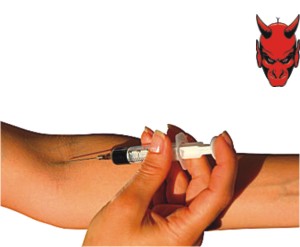Feature
School curricula
based HIV/AIDS awareness campaign
Rafiqul Islam
 It is true that awareness about the deadly consequences of HIV infection has to be developed when a person has just reached adolescence and becoming conscious about the physical changes. Attraction for the opposite gender is a common phenomenon and there is nothing wrong in that. But things begin to go wrong when an adolescent boy or a girl starts to go out with the wrong kind of friends who take drugs orally or use the same syringe for the purpose and also get involved in unsafe sex and so on. Because of social and cultural teachings, such tendency among the literate youths is very insignificant and yet one must know in details about what causes HIV to spread and what does not. The National AIDS/STD Programme of the government with the support of the Global Fund is undertaking some massive campaign to create awareness among the youths of the country. That is why I wanted to share some information with the young readers of Star campus which I came across in a meeting in an NGO. It is true that awareness about the deadly consequences of HIV infection has to be developed when a person has just reached adolescence and becoming conscious about the physical changes. Attraction for the opposite gender is a common phenomenon and there is nothing wrong in that. But things begin to go wrong when an adolescent boy or a girl starts to go out with the wrong kind of friends who take drugs orally or use the same syringe for the purpose and also get involved in unsafe sex and so on. Because of social and cultural teachings, such tendency among the literate youths is very insignificant and yet one must know in details about what causes HIV to spread and what does not. The National AIDS/STD Programme of the government with the support of the Global Fund is undertaking some massive campaign to create awareness among the youths of the country. That is why I wanted to share some information with the young readers of Star campus which I came across in a meeting in an NGO.
First of all I want talk about the catchy slogan: “Bachtey Holey Jantey Hobey” to create awareness about HIV/AIDS. I find that it has become quite popular thanks to widespread media publicity. Since no treatment of AIDS has yet been discovered, prevention is the only way to prevent HIV infection. And getting correct information is essential for taking such preventive measures. This rationale worked behind approving the slogan “Bachtey Holey Jantey Hobey.”
It is also interesting to note that a full chapter on HIV/AIDS, how the virus spreads from human to human, how to prevent and what to do with an AIDS patient etc has been included in the curriculum of SSC and HSC (from class 6 to 12) to create awareness among the young generation. According to NASP, this is for the first time in Asia that HIV/AIDS related messages have been included in the English and Bengali textbooks from class VI to class XII. And this was possible because of the understanding among the Ministry of Education, directorates under this ministry, Ministry of Health. National HIV/STD Program, various educational institutes, religious and social leaders, guardians and students. Under this program, 44, 375 teachers of 8, 875 educational institutes have been given the required training.
Another interesting finding is that through holding 354 advocacy workshops in the country, relevant messages have been disseminated among about 15 thousand policy makers, religious and social leaders and guardians. And under this programme, a campaign is being conducted titled, “Religious Leaders and HIV/AIDS.”
Youth-friendly Health care
This is possibly the most important component among all the intervention programmes. A national benchmark for youth-friendly health care services has been agreed upon by the Ministry of Health and Family Welfare, Directorate of Health, Directorate of Family Planning, National AIDS/STD Program, Civil Surgeons, World Health Organization and other experts to extend required services through 124 government, non-government and privately owned health care centers. In order to collect information concerning the youth clients, a new column following national MIS format has been included. It needs to be mentioned that Bangladesh is the fourth country where youth friendly health services are being provided through government, NGO and private health centers. At the same time, Life Skill Learning programme to prevent HIV/AIDS is being carried out for nearly 100,000 young people through the youth clubs/organizations and NGOs enlisted with the Directorate of Youth. This program is being carried out through 124 clubs, organizations and NGOs. The program would help the youth have comprehensive idea about the risks of HIV/AIDS and thus protect themselves. The programme is expected to be scaled up in phases.
(Writer is a student and member of Jhinookmala socio-cultural organisation)
|
